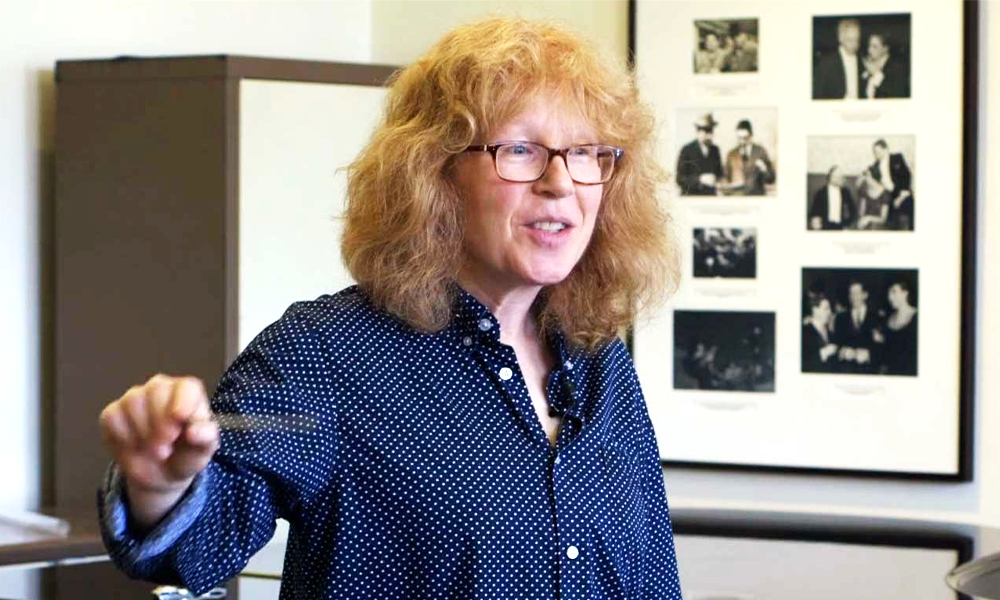Meet 18-year-old Isaac from Sheffield. When he’s not at home spending time with his family, the National Orchestra for All ambassador can’t get enough of his violin (and learning the lyrics to iconic Disney movies). We caught up with him over a virtual tea break to hear his inspiring story.
How have you been spending your time in lockdown?
Well, right now I’m on a gap year. Mostly what I’ve been doing is helping out around the house and the family – my dad’s just got a new job for the first time in a while. He was long-term disabled and has chronic pain in his back, which has gotten better enough that he can work again, which is good.
He’s studying for a PGCE and my mum’s busy working as a midwife, so I’m doing the cooking for the family. It’s really good for him to be doing that – he really enjoys teaching and it gives him something to do!
Read more: 13 ways you can be kind to others in an inclusive youth orchestra >
Isaac: “I love how much expression you can get from the violin, the range and different tones of sound.”
What inspired you to play the violin?
I first picked up the violin in Year 5 because of Sheffield Music Hub – it’s a council-funded music service. They’d bring in about 30 violins into a school and taught our whole class the basics. They did that at my school and because I enjoyed it and there were a few demonstrations from other people, I then went to some lessons that they did for a while.
Read more: National Orchestra for All ambassadors share their musical favourites >
I love how much expression you can get into it – the range and different tones of sound. You can make it really beautiful and show lots of emotion through how you're doing the bowing, the ‘vibrato’ and everything. It has a lot of expression.
What music have you been listening to lately?
One song I particularly like is ‘Meditation’ – I can't remember who the composer is but that's a lovely, sweet one. Another I'm enjoying playing right now is Czárdás by Monti (the solo parts). I'm just having a go at it in my own time, when I'm not practising for my orchestras and things.
I don't tend to pick a band and follow their albums, I collate certain songs normally – but a band I've listened to in lockdown is The Longest Johns who do sea shanties, they’re fun and good to sing along to! I’ve also been listening to the album The Green Knight by Heather Dale and songs like Suzanne Vega’s ‘The Queen & the Soldier’, I really like that one. And I've been learning how to sing ‘Hellfire’ from Hunchback of Notre Dame – that’s been fun!
National Orchestra for All ambassador and violinist Isaac (pictured middle) performs with musical friends.
Tell us about your musical journey.
Well, I’ve been with Orchestras for All for a long time. I’m 18 now and I’ve been going to National Orchestra for All (NOFA) since I was 11 – it's great! But I also think it’s helped me in different ways as I've got older. Right at the start the music lessons at my primary school stopped, so I had 20 minutes of lessons with a teacher for a little chamber orchestra of young people that I was a part of.
I think she got an email or text saying that somebody she was teaching didn’t want a place at NOFA – but then she noticed me and said, “Hey, would you like to do it?” and I was like, “Oh okay, yeah!”. That’s how I got there and it’s been great. Early on, what NOFA gave me was my first taste of large music collaboration. The only thing I’d done before that was the little chamber orchestra, so it was amazing!
Find out more about National Orchestra for All >
At first I was quite scared – it was the first time I'd been away from home for a while and the music was much faster than I’d expected. I think the first thing I got was a full rehearsal and that was a bit much and I burst into tears, but then one of the tutors took me out and I had a chance to calm down. They listened to me. And then me and another person got a third violin part and had a little time with a tutor on our own to go through it – and from then on, it was just great!
I've met loads of great people, but I didn't really keep in touch with them outside NOFA courses until last year when a group of us got put together in the Young Leaders programme. We were organising the recital evening and made a group chat to talk about it when we were in our rooms and stuff. We've kept in touch ever since! And now we’re the new cohort of ambassadors as well, so that's been great.
Isaac presents his violin (pictured bottom left) on Zoom during a National Orchestra for All course.
How has National Orchestra for All impacted your life?
When my dad became sick with his chronic pain, my sister got glandular fever and then chronic fatigue syndrome. With my mum working a lot of the time as well, I kind of took on a bit of a young carer role and NOFA was just a place for me, you know?
Watch musicians’ plea as they urge public to break down barriers to music making >
It was people who I knew, it was my experience, and my family would come and they were really supportive. It was a place where for a bit of time each year, I did this wonderful thing with lots of people – and it was just for me.
What advice would you give to aspiring young musicians?
No matter what your technical ability is with your instrument, the most important thing is to put your energy and emotion into the piece you’re playing. In an orchestra there are lots of people, so it isn’t a bit deal if you’re out of tune or if you don't get all the notes of the run right. But if you play with the colour and the energy and get your emotions involved in the piece, that will come across.
“If you play with the colour and energy of the piece and get your emotions involved, that will really come across,” says the young violinist.
Complete the sentence: Orchestras for All is…
Great! The thing about Orchestras for All – and what makes it really something special – is that firstly, they make a real effort to listen to the young people they're working with, to the extent that I don't see elsewhere.
It treats its young musicians with respect as well, it never condescends. I think that’s one of the things that made it so great as a young person to be involved with it – you felt really supported and respected in a way that you don’t get so much in school.
Discover 5 ways to protect your wellbeing >
Why is youth voice so important today?
A couple of things: firstly, young people are the future. The young people that are being listened to and encouraged now, they take that with them, if you know what I mean? It makes them more confident to respect themselves and speak out about what they think is important. If people have the chance to really be listened to, I think you’ll find they are more willing to speak and act on things that they care about.
And the second thing is that young people have their own set of perspectives and experiences. They can be just as smart as adults (often in different ways, but they really are!).
To fund a life-changing programme for young musicians like Isaac, please donate today >
































